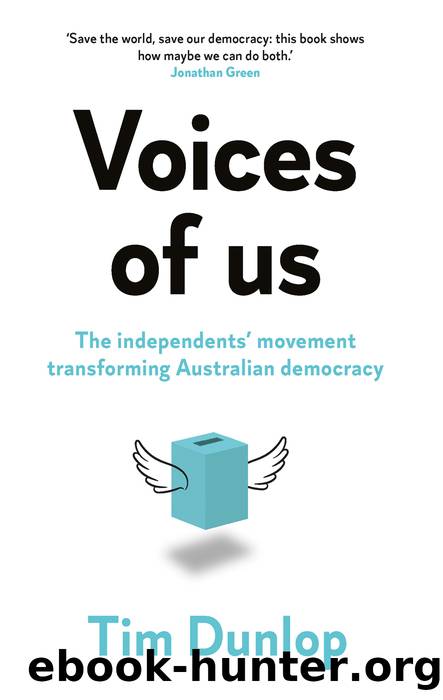Voices of us by Tim Dunlop

Author:Tim Dunlop
Language: eng
Format: epub
Publisher: NewSouth Publishing
Published: 2022-10-27T00:00:00+00:00
His views were hiding in plain sight, but he also went to extraordinary lengths to disguise them. Just as John Howard supported the neoliberal disruption of the material conditions of a stable society with ever more rhetorical emphasis on the traditional family, Scott Morrison supported his do-nothing approach to government with PR stunts that made it look like he was doing something. He had a personal staff of 51 in the Office of Prime Minister and Cabinet, and ten of them were employed as media advisers. This performative aspect of his prime ministership, the endless and relentless production of photographs and videos of the prime minister cooking a curry, building a cubby house, washing someoneâs hair; the hi-vis-wearing visits to worksites around the country; the photos of him being given a red carpet welcome by the Air Force; images of him doing âtoursâ of bushfire-affected towns and shaking peopleâs hands, whether they wanted to or not â all of these stunts, illusions and advertising were a necessary adjunct to the project of undermining government in which he was engaged.
In other words, we were being railroaded into a diminished understanding and practice of government by a prime minister ideologically opposed to the very idea of government as a bulwark against the risks inherent in a complex society. Our image of ourselves as an egalitarian nation took a hit with every smirk on the prime ministerâs face, and the rest of the political class, including the media, either kept quiet, perhaps waiting to see what was in it for them, or were openly complicit in the transformation. In doing so, they were violating the key rule that kept the status quo invisible and acceptable. As Canadian writer John Ralston Saul has said: â[Elites] make no sense as a group unless they have a healthy and productive relationship with the rest of the citizenryâ, and it was becoming apparent that Australia was being stratified in ways that more and more people were finding unacceptable. Saul said that elites, the bearers and beneficiaries of the status quo, âmay prosper far more than the average citizen in the processâ and that they âmay have all sorts of advantagesâ, but most people wonât care âso long as the greater interests are also servedâ.
Scott Morrisonâs approach to government made it clear that the greater interests would likely never be served, and that he saw government as nothing more than a way of distributing public funds to private providers, whether it was in areas of defence, welfare, or in the response to climate-driven disasters. Indeed, the disasters themselves were a growing source of private profit, and journalist Ben Cubby, in a post-election article in the Sydney Morning Herald, noted that âPrivate enterprise that specialises in disaster recovery has found a profitable niche by taking on roles that were once assumed by government.â Any doubt that this anti-government approach was the driving logic of Scott Morrisonâs prime ministership was dispelled two months after his government was thrown from office
Download
This site does not store any files on its server. We only index and link to content provided by other sites. Please contact the content providers to delete copyright contents if any and email us, we'll remove relevant links or contents immediately.
The Secret History by Donna Tartt(19092)
The Social Justice Warrior Handbook by Lisa De Pasquale(12191)
Thirteen Reasons Why by Jay Asher(8912)
This Is How You Lose Her by Junot Diaz(6889)
Weapons of Math Destruction by Cathy O'Neil(6281)
Zero to One by Peter Thiel(5802)
Beartown by Fredrik Backman(5756)
The Myth of the Strong Leader by Archie Brown(5509)
The Fire Next Time by James Baldwin(5447)
How Democracies Die by Steven Levitsky & Daniel Ziblatt(5219)
Promise Me, Dad by Joe Biden(5154)
Stone's Rules by Roger Stone(5088)
A Higher Loyalty: Truth, Lies, and Leadership by James Comey(4964)
100 Deadly Skills by Clint Emerson(4926)
Rise and Kill First by Ronen Bergman(4790)
Secrecy World by Jake Bernstein(4753)
The David Icke Guide to the Global Conspiracy (and how to end it) by David Icke(4720)
The Farm by Tom Rob Smith(4514)
The Doomsday Machine by Daniel Ellsberg(4490)
